Gut-Brain Connection: A Guide to Better Mood & a Healthier Gut
Discover how Gut-Brain Connection works and learn simple lifestyle changes to boost digestion, mood, and overall well-being.
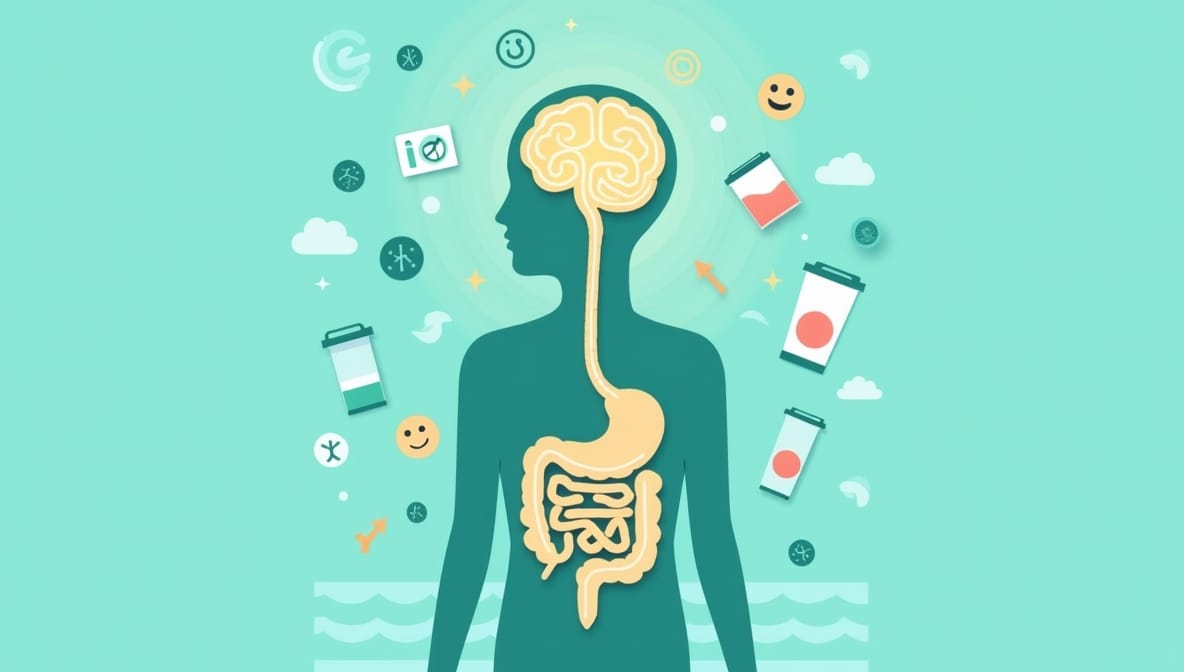
Have you ever felt "butterflies in your stomach" when you are nervous or a "gut-wrenching" feeling after bad news? These common sensations are not just metaphors; they are physical evidence of the gut-brain axis, a bidirectional communication network between your gut and your brain. For years, we thought the brain was the sole commander of our body's functions, but new research is revealing that the gut, with its trillions of microbes, plays a major role in regulating our mood, stress, and even cognitive function.
The Science Behind the Gut-Brain Connection
A fascinating new area of scientific research is revealing a profound connection between our gut and our brain. It's more than just feeling "butterflies in your stomach" before a big event; it's a constant, two-way conversation that influences everything from our mood and stress levels to our cognitive function. This intricate communication system is known as the gut-brain axis.
Why?
Think of your gut as your "second brain." While it can't write an email or solve a math problem, it's constantly talking to your main brain. This two-way communication system is called the gut-brain connection.
It's important to understand this link because it explains a lot of things we've always felt but couldn't explain. For example, why do we get "butterflies in our stomach" when we're nervous, or feel a "gut-wrenching" sadness? The emotional signals from your brain can directly affect your stomach, and in a surprising twist, what's happening in your gut can also change your mood and thoughts.
This connection isn't just about feelings. It's about your overall well-being. The trillions of tiny bacteria living in your gut play a huge role in producing chemicals like serotonin, the "happy hormone." An unhealthy gut can lead to a shortage of these good chemicals, which can contribute to things like brain fog, anxiety, and even depression.

Licensed by Google
By learning how this system works, you can make smarter choices about what you eat and how you manage stress. Nurturing your gut isn't just about better digestion; it's a powerful way to support a clearer mind and a happier you. 🧠💡
How?
This powerful connection is made possible by a few key players:
- The Vagus Nerve: Think of this as the main "information highway" 🛣️. It's the longest nerve in the body, directly linking the brain and the gut. Signals about everything from the food you've eaten to the health of your gut lining travel up and down this nerve, providing your brain with a continuous stream of feedback.
- Neurotransmitters: The gut is a surprisingly productive biochemical factory. It produces more than 90% of the body's serotonin, the "happy hormone" that plays a crucial role in regulating mood, appetite, and sleep. The gut also produces other important neurotransmitters, like dopamine and GABA, which are linked to pleasure and reduced anxiety.
- The Gut Microbiome: This is the heart of the connection. Your gut is home to trillions of microorganisms—bacteria, viruses, and fungi—that collectively form your microbiome. These microbes are not just passive inhabitants; they produce compounds and metabolites that can directly affect your brain's chemistry. When your microbiome is imbalanced, it can lead to increased inflammation, which research has linked to mental health issues such as anxiety and depression.
In short, a healthy gut is not just about comfortable digestion—it's about supporting a healthy mind. This groundbreaking understanding is revolutionizing how we approach both physical and mental well-being.
Top 5 Gut-Brain Health Supplements
To support this vital connection, many people are turning to supplements. Here are five top-ranking products on Amazon, with their pros, cons, and editor's choice.
Garden of Life Dr. Formulated Probiotics Mood+
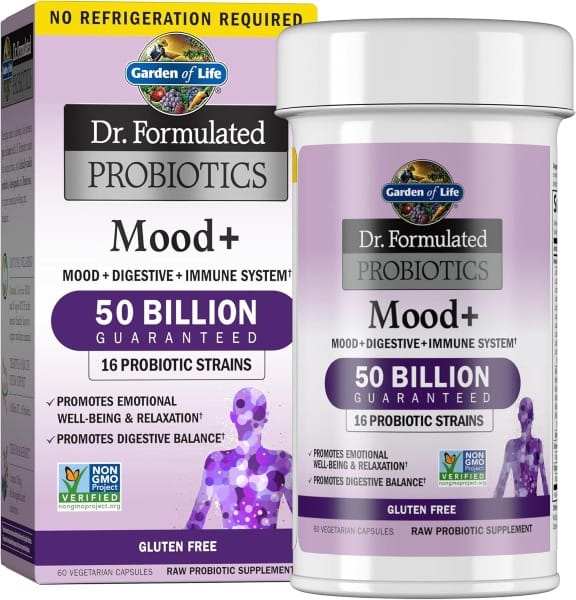
- Pros: Formulated specifically for mood and stress, with a high CFU count and diverse strains of Lactobacillus and Bifidobacterium. It also contains organic ashwagandha, an adaptogen known for its stress-reducing properties.
- Cons: Can be pricey compared to other probiotics. Some users report no noticeable effect on mood.
Physician's Choice 60 Billion Probiotic
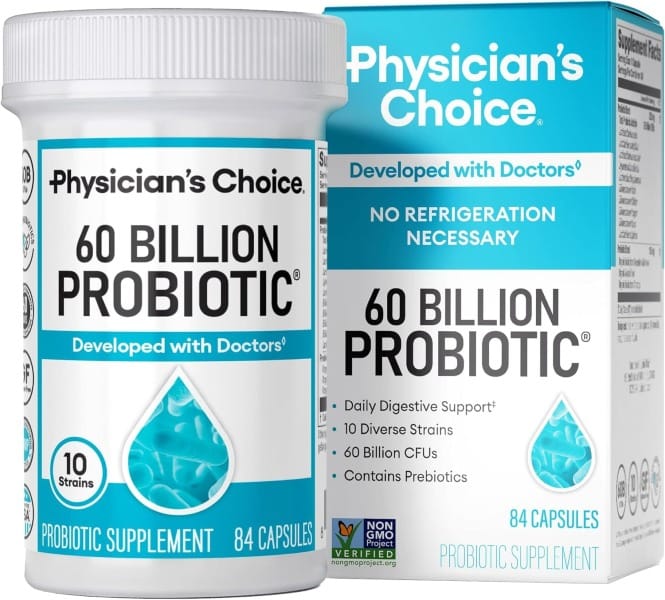
- Pros: A high-potency formula with 10 different strains and a significant CFU count. It's a best-seller on Amazon with thousands of positive reviews.
- Cons: Not specifically marketed for the gut-brain axis, though the high CFU and diverse strains will still be beneficial.
PrimeBiome Gut-Brain-Skin Connection Probiotic
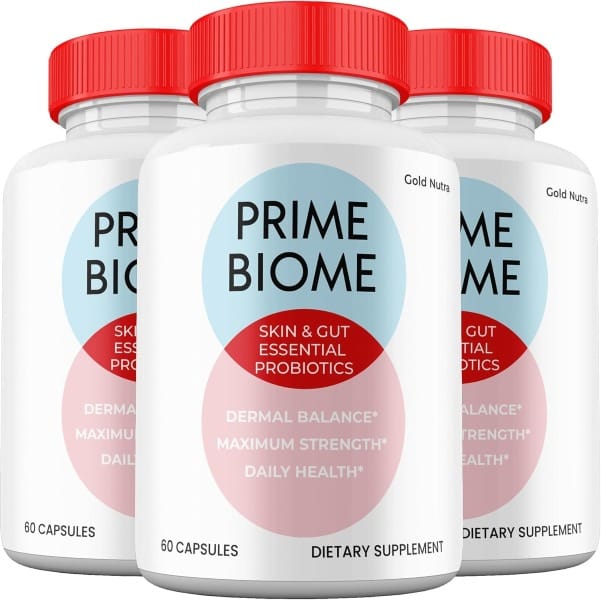
- Pros: This product is uniquely formulated to target the gut-brain-skin axis. It contains Bacillus coagulans and herbal adaptogens, providing a two-in-one approach to wellness. It also comes with a 60-day money-back guarantee.
- Cons: It's a newer product, so it may not have as many long-term reviews as more established brands.
Pendulum Akkermansia
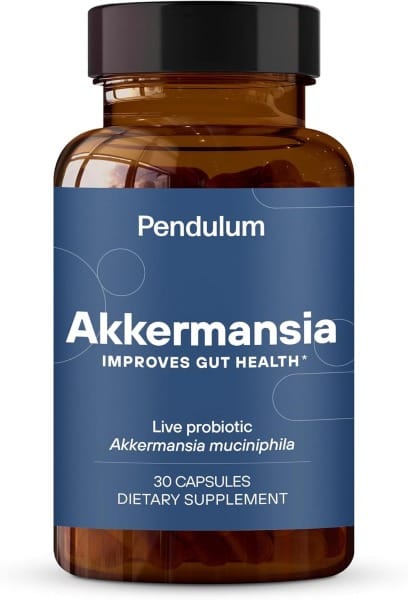
- Pros: This unique product contains Akkermansia muciniphila, a foundational strain of bacteria that fortifies the gut lining. A stronger gut lining can reduce permeability and support the vagus nerve's ability to communicate effectively with the brain.
- Cons: It's one of the more expensive options and focuses on a single strain, which may not be ideal for those seeking a more diverse probiotic blend.
Ritual Synbiotic+
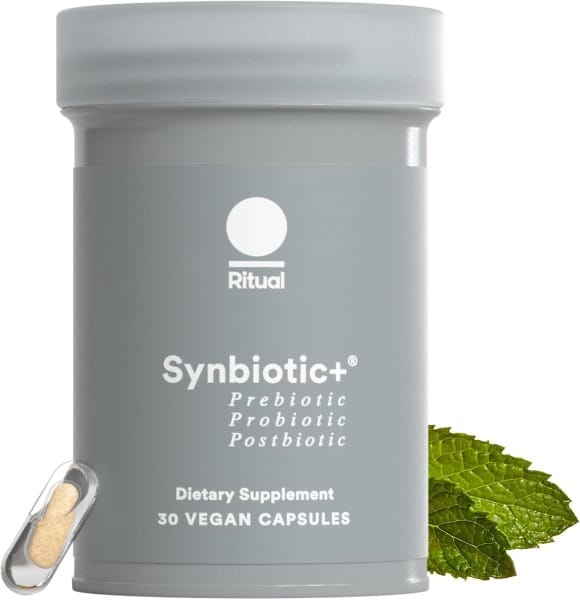
- Pros: A "three-in-one" formula containing prebiotics, probiotics, and postbiotics, which work synergistically to support gut health. The delayed-release capsule ensures the ingredients survive stomach acid.
- Cons: The CFU count (11 billion) is lower than that of some competitors; however, the inclusion of prebiotics and postbiotics may compensate for this.
Editor's Choice: Physician's Choice 60 Billion Probiotic. While other products are specifically formulated for the gut-brain axis, Physician's Choice offers a high-potency, well-reviewed, and affordable option that provides a strong foundation for overall gut health, which in turn supports the brain. It's a great entry point for anyone looking to improve their gut health without a significant financial commitment.
Frequently Asked Questions
By analyzing what people search for and what they ask on platforms like Quora, here are the top 5 most frequently asked questions about the gut-brain connection.
Q1: How do gut bacteria affect my mood?
A: Scientists are learning more every year about the fascinating connection between the gut and the brain — often called the gut–brain axis. Your gut isn’t just about digestion; it also plays a surprisingly powerful role in how you feel emotionally.
Here’s how gut bacteria can affect your mood:
- Chemical Messengers (Neurotransmitters)
- Gut microbes help produce important neurotransmitters like serotonin, dopamine, and GABA. In fact, about 90% of serotonin — the “feel-good” chemical — is produced in the gut, not the brain. When your gut bacteria are balanced, they help regulate these mood-related chemicals.
- Communication Through the Vagus Nerve
- The gut and brain are directly connected by the vagus nerve, like a two-way communication highway. Signals from your gut microbiome can influence how the brain processes stress, anxiety, or relaxation.
- Immune & Inflammation Control
- Gut bacteria play a big role in your immune system. An unhealthy gut can cause chronic inflammation, which is linked to depression and anxiety. A balanced microbiome helps keep inflammation under control, which supports better mental health.
- Stress Response Regulation
- A diverse gut microbiome helps regulate the body’s stress system (the HPA axis). Imbalances in gut bacteria can make stress responses more intense, leading to higher feelings of anxiety or irritability.
- Evidence from Studies
- Researchers have found that people with conditions like depression and anxiety often have less diverse gut bacteria. On the other hand, diets rich in fiber, fermented foods, and probiotics tend to support both gut health and mood.
- Some studies even show that probiotics (sometimes called “psychobiotics”) can reduce mild anxiety or depressive symptoms.
Your gut is often called your “second brain” for a reason. A healthy, diverse microbiome doesn’t just help digestion — it can actually help you feel calmer, happier, and more resilient to stress.
What you can do to support your gut (and mood):
- Eat a variety of plant-based, high-fiber foods.
- Add fermented foods like yogurt, kefir, kimchi, or sauerkraut.
- Stay hydrated.
- Reduce processed foods and excess sugar.
- Consider probiotics or prebiotics (after talking with a doctor).
So, if you’ve ever had a “gut feeling” that your digestion and emotions are linked — science now confirms you were right!
Q2: What are some signs of an unhealthy gut-brain connection?
A: The gut and brain are more connected than most people realize — through the gut-brain axis, a two-way communication system involving nerves, hormones, and even gut microbes. When this connection is disrupted, you can experience symptoms that affect both your digestion and your mental well-being.
Some common signs of an unhealthy gut-brain connection include:
- Digestive Issues Beyond the Usual
- Chronic bloating, gas, diarrhea, constipation, or irritable bowel syndrome (IBS) often point to a stressed gut. These can be triggered or worsened by anxiety, showing how the brain and gut interact.
- Frequent Mood Swings or Anxiety
- An imbalanced gut microbiome can reduce the production of neurotransmitters like serotonin (much of which is made in the gut). This can contribute to increased anxiety, irritability, or even depression.
- Brain Fog or Trouble Concentrating
- Many people with gut dysbiosis report poor focus, forgetfulness, or a general “cloudy” mental state. Inflammation in the gut can influence brain inflammation, leading to cognitive effects.
- Unexplained Fatigue
- A disrupted gut-brain connection can affect sleep quality and energy regulation. If you feel tired even after resting, your gut health could be playing a role.
- Food Sensitivities and Cravings
- A compromised gut barrier can make you more reactive to certain foods. At the same time, some “bad” microbes actually influence cravings (like sugar), pulling your brain along with them.
- Increased Stress Response
- If your gut isn’t balanced, you might find yourself overreacting to small stressors, with higher cortisol spikes. Stress worsens gut problems in return — creating a vicious cycle.
- Skin Problems (like acne, eczema, rosacea)
- Because the gut influences inflammation and immunity, skin flare-ups are often linked with gut-brain imbalance.
What to do if you notice these signs?
- Start by looking at your diet (fiber-rich, whole foods, probiotic, and prebiotic sources).
- Manage stress with practices like meditation, yoga, or regular movement.
- Get enough quality sleep.
- Consult a healthcare professional if symptoms are persistent — especially for chronic digestive or mood disorders.
The gut-brain axis is a two-way street. Supporting one often helps the other, leading to better overall health.
Q3: Can taking probiotics or prebiotics help with anxiety and depression?
A: There’s growing scientific interest in the connection between the gut and the brain, often called the gut-brain axis. This system links your digestive health to your mood and mental well-being, and probiotics and prebiotics play a key role in it.
Probiotics are live, “good” bacteria that help balance your gut microbiome, while prebiotics are fibers that feed these bacteria. When your gut bacteria are in balance, they produce beneficial compounds like short-chain fatty acids and neurotransmitters (for example, serotonin and GABA), which influence mood regulation.
What research says:
- Several studies suggest that certain probiotic strains (like Lactobacillus and Bifidobacterium) may help reduce symptoms of anxiety and mild depression.
- Prebiotics, by nourishing gut bacteria, may indirectly support better mood regulation by reducing gut inflammation and improving overall microbiome health.
- A 2019 meta-analysis found “modest but promising” benefits of probiotics for mood, especially in people with mild stress or anxiety. However, results are mixed, and not all strains have the same effect.
Why it might help:
- Neurotransmitter production: Gut bacteria produce or influence the production of serotonin, dopamine, and GABA — chemicals crucial for mood.
- Reduced inflammation: A healthier gut can lower systemic inflammation, which has been linked to depression.
- Stress response: Some probiotics may help regulate cortisol, the body’s stress hormone.
Important things to know:
- Probiotics and prebiotics are not a cure for anxiety or depression. They may be supportive tools alongside lifestyle changes, therapy, or medication.
- Benefits often depend on the strain, dosage, and duration of use — not all probiotics are equally effective.
- It’s best to start with a high-quality supplement or probiotic-rich foods (like yogurt, kefir, sauerkraut, kimchi) and prebiotic foods (like bananas, garlic, onions, oats).
- Always consult a healthcare provider before starting, especially if you are already on medication for mental health.
Yes, probiotics and prebiotics may help support mental well-being by improving gut health and influencing brain chemistry. Think of them as part of a bigger toolbox for managing anxiety and depression — alongside therapy, regular exercise, good sleep, and professional guidance.
Q4: What's the difference between probiotics and prebiotics?
A: These two often get mixed up, but they play very different (and complementary) roles in gut health.
Probiotics are live beneficial bacteria (and sometimes yeasts) that you consume through foods or supplements. Think of them as “good bugs” that help balance your gut microbiome. Common strains include Lactobacillus and Bifidobacterium, which you’ll find in yogurt, kefir, sauerkraut, kimchi, and probiotic capsules. Their main role is to support digestion, strengthen the immune system, and crowd out harmful bacteria.
Prebiotics, on the other hand, are non-digestible fibers that act as “food” for those good bacteria. They don’t contain live organisms, but they help your existing healthy gut bacteria thrive. You’ll find prebiotics in foods like garlic, onions, bananas, oats, and asparagus. By feeding your good bacteria, prebiotics encourage them to multiply and function more effectively.
An easy way to remember it is:
- Probiotics = the good bacteria themselves
- Prebiotics = the food that helps the good bacteria grow
When used together (often called a synbiotic approach), probiotics and prebiotics work synergistically — probiotics introduce and support beneficial microbes, while prebiotics help them survive and flourish in your gut.
So, if you’re looking to improve digestion, reduce bloating, or support overall gut health, it’s smart to think about both sides of the equation: adding live cultures and feeding them with the right fibers.
Q5: What lifestyle changes can I make to improve my gut-brain connection?
A: Your gut and brain are constantly “chatting” through a network called the gut-brain axis. This communication affects everything from digestion and immunity to mood and focus. The good news is that certain lifestyle changes can strengthen this connection and help both your gut and brain function better:
- Eat more fiber-rich and probiotic foods
A diet high in whole foods, fruits, vegetables, legumes, and whole grains feeds the “good bacteria” in your gut. Adding probiotics (like yogurt, kefir, sauerkraut, kimchi, or kombucha) introduces more beneficial microbes that support healthy gut flora. These microbes, in turn, produce neurotransmitters like serotonin that influence your brain and mood. - Limit processed foods and added sugars
Highly processed foods and excess sugar can disrupt gut bacteria balance, which has been linked to inflammation, brain fog, and even anxiety or depression. Opt for minimally processed, nutrient-dense foods whenever possible. - Stay hydrated
Water helps keep your digestive system moving and supports nutrient absorption, both of which are key for a healthy gut and clearer mind. - Manage stress effectively
Stress is one of the biggest disruptors of the gut-brain axis. Practices like meditation, yoga, deep breathing, or even a daily walk can help calm your nervous system and reduce stress-related gut issues (like bloating or cramps). - Prioritize quality sleep
Poor sleep negatively affects both the gut microbiome and brain function. Aim for 7–9 hours of consistent, restful sleep. A bedtime routine—like reducing screen time and keeping a regular schedule—can make a huge difference. - Exercise regularly
Movement doesn’t just strengthen your body—it also stimulates healthy microbial diversity in your gut. Moderate, consistent exercise has been shown to improve mood, reduce anxiety, and support digestive health. - Be mindful of antibiotics and medications
While sometimes necessary, antibiotics can wipe out beneficial bacteria. If you do need them, consider discussing probiotic support with your healthcare provider to help restore gut balance. - Practice mindful eating
Slow down and pay attention to how and what you eat. Chewing thoroughly, avoiding overeating, and tuning into hunger and fullness cues help digestion and reduce stress signals between your gut and brain.
Bottom line: Small daily habits—like eating more fiber and probiotics, reducing stress, exercising, and sleeping well—can significantly strengthen your gut-brain connection. Over time, you may notice not just better digestion, but also improved mood, sharper focus, and greater resilience to stress.
